|
As with my recent reviews of Sam Fuller’s Hell and High Water and House of Bamboo, this edition of Forty Guns is only available as part of Eureka’s Fuller at Fox: Five Films 1951-1957. Unlike those films, however, which had previously only been made available on DVD in the UK by Optimum (now Studiocanal), Forty Guns was released here on Blu-ray by Eureka back in 2015, and at first glance the version here looks to be the same disc. The two discs even have the same background picture on the main menu. Thus, as my views on the film have not changed in the four short years since I last wrote about it, I initially saw little point in reposting that review with a sprinkling of new frame grabs when I could instead just throw up a tweet containing a link to the original piece. On checking the disc out, however, I discovered a couple of significant differences that give this new edition a notable edge over its predecessor. So forgive the fact that this is, for the most part, the very same review as the one for the 2015 Blu-ray, but reposting it here avoids the inconvenience of sending newcomers to the film back and forth between the two reviews. If you’re solely interested in what has changed in this release, hop to the Sound and Vision header below.
The conventions of the Western are so firmly established and so widely recognised that we tend to regard the genre as relatively safe ground, particularly if the film under discussion was made before The Wild Bunch came along and turned things on their head. If you sit down for a western that was made back in the 40s or 50s, you have certain expectations that will usually be met, expectations about the setting, the characters, the storylines and the iconography. It was genre writer Frank Gruber who famously claimed that there were only seven Western plotlines,* and the reliable and very visible presence of these components have made westerns a favourite for teaching genre on media studies courses. It thus comes as a bit of a jolt to encounter a film made in 1957 that plays games with those conventions. But then Forty Guns is a Samuel Fuller film, released hot on the heels of his equally impressive Run of the Arrow, which also didn't play by the genre rules. Fuller's best films rarely did.
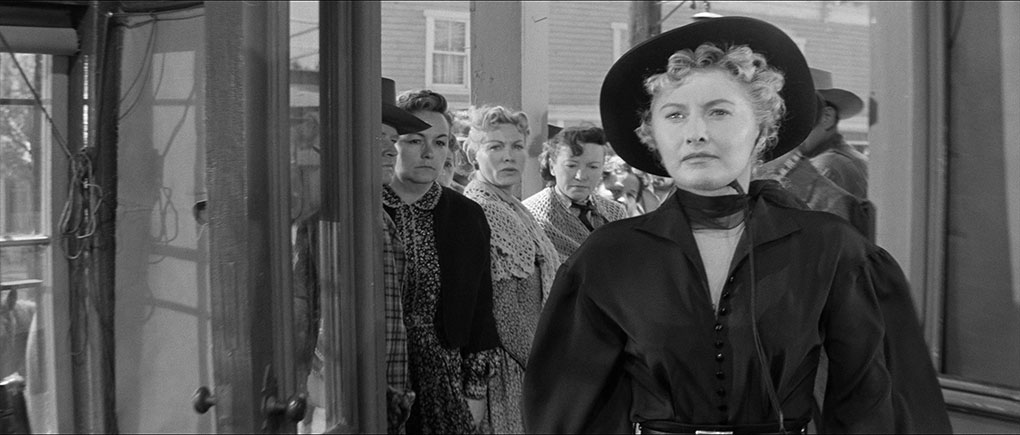
This break with tradition is evident from the opening scene, as a straightforwardly framed shot of three men driving a wagon towards the Arizona town of Tombstone is intercut with the image of a herd of galloping riders, the camera framed on the legs of the horses and tracking rapidly alongside them. The editing informs us that the riders are heading straight towards the three presumably unsuspecting men, whom we can suppose are about to fall victim to a surprise attack of some magnitude. Yet when this column of riders reaches the wagon it divides down the middle and races past it like a mountain river that has encountered a rock, startling the men and their horses but otherwise leaving them unmolested. These, we can presume, are the titular forty guns, and we soon discover that they work for the rancher who effectively runs this territory. As an opening sequence it certainly gets your attention. But conventional? No way. And just who is this rancher that no sane man would dare cross? Why it's hard-nosed, black dressed, whip-cracking Jessica Drummond, played by a rather splendid Barbara Stanwyck. Yep, the toughest hombre in Tombstone is actually a woman. Up yours, genre tradition.
A nod to established gender roles comes in the shape of a soundtrack song that colourfully describes Jessica as "a high riding woman...with a whip," the asks what kind of man will it take to tame her. We can presume that none of her own men is up to the job, so what about these three new arrivals? It turns out they are brothers. Griff Bornell (Barry Sullivan) is a reformed gunslinger who now works for the Attorney General's office and is in town to arrest a man named Howard Swain for mail robbery. With him are his brothers Wes and Chico. Wes (Gene Barry) is a cheerful chip off the older brother-shaped block, but the fatherly Griff is keen that the younger Chico (Robert Dix) should not follow in his footsteps and instead follow a more respectable career as a farmer, something that appears to get up the eager Chico's nose.
The boys have hardly got settled in town before Jessica's wild younger brother Brockie gets plastered and starts shooting up main street after planting a bullet in the leg of the town's half-blind marshal John Chisolm. Griff quickly puts a stop to this by marching up to Brockie and smacking him out cold with a single pistol blow. Brockie is locked up, but Jessica's having none of it, and in one of the swiftest examples of kangaroo justice I've ever seen (Brockie is out of his cell and heading home even before the judge has finished his quasi-legal spiel), the long standing status quo is restored. Of course it's not destined to last. When Wes falls in love with the gunsmith's sparky daughter Louvenie, he sets his eye on staying in Tombstone and becoming its new marshal, and when Griff saves Jessica's life during a tornado-driven storm, the two find themselves increasingly attracted to each other. But some of Jessica's men have other plans for this unwelcome interloper.
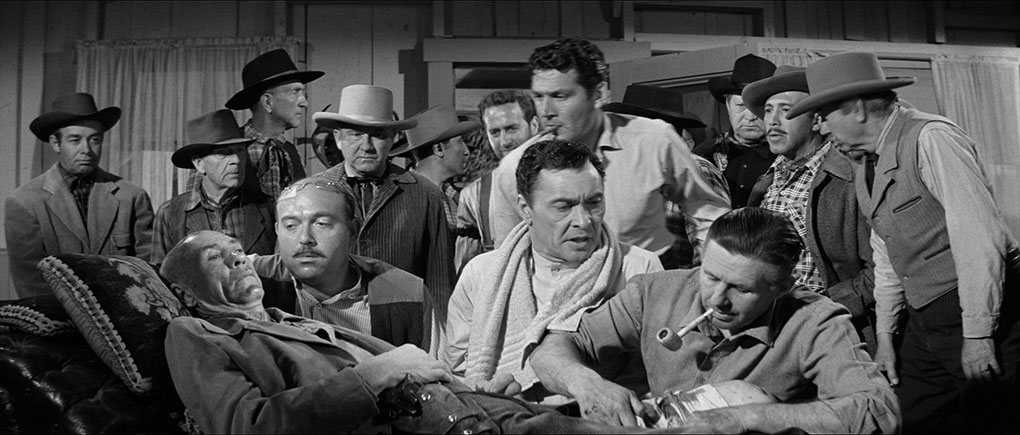
Typical of Fuller during his golden period, Forty Guns is a blisteringly well made film, excitingly paced and employing some of the longest walk-and-talk tracking shots the screen had ever seen. He makes terrific compositional use of the monochrome CinemaScope frame, and at one point includes a huge close up of Griff's eyes that foreshadows the iconic use of this very shot by Sergio Leone in his celebrated spaghetti westerns. There's even a point-of-view shot in which Wes observes Louvenie through the barrel of a rifle that draws a partial template for the iconic opening image of every James Bond film to follow. Fuller also delivers what may well be the most hair-raisingly convincing pre-CG depiction of a tornado, a superbly staged set piece in which Griff and Jessica battle against ferocious wind that flips a cart over and tears the roof clean off the building they are struggling to reach.
But what really caught me out were the sexual innuendoes, a not uncommon trick in these days of censorial moral watchdogs but rarely as blatantly up-front as this. It kicks off when Louvenie is measuring Wes up for a custom made rifle, and as the pair exchange the filthiest of looks, Wes strokes the wooden rifle stock in a manner that some might suggest has almost pornographic overtones. A short while later he and Louvenie kiss. "I've never kissed a gunsmith before," he tells her. "Any recoil?" she replies with suggestive smile. This run of double meanings peaks when Griff and Jessica are having a social chat and sizing each other up in a manner that suggests a degree of mutual attraction is blossoming.
| |
Jessica: "I'm not interested in you, Mr. Bonnell. It's your trademark." |
| |
She holds out her hand. |
| |
Jessica: "May I feel it?" |
| |
Griff: (shakes head) "Uh-uh." |
| |
Jessica: (with a suggestive smile) "Just curious." |
| |
Griff: "It might go off in your face." |
| |
Jessica: "I'll take a chance." |
| |
Griff reaches below the table to his trousers and pulls out his gun. |
Had I been taking a drink at this point, I'd have probably choked. I have a feeling that Freud would have had a field day here.
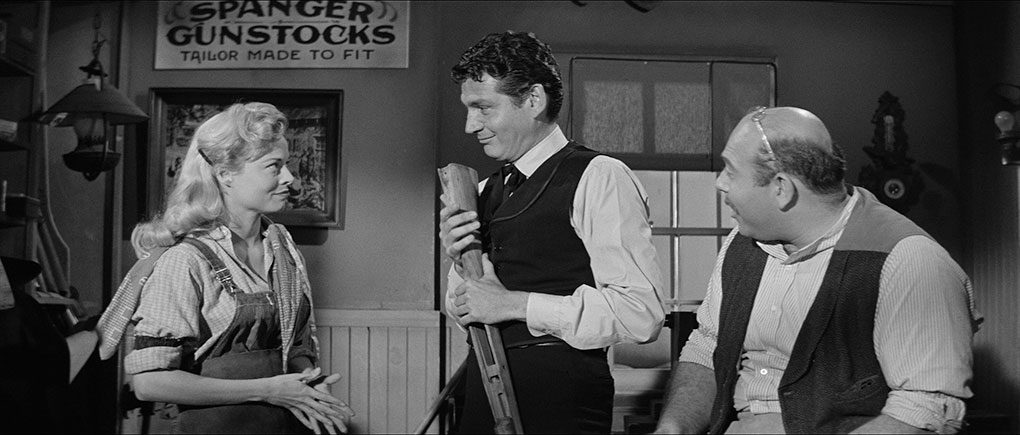
Taking inspiration from Wyatt Earp's time in the real world Tombstone (this connection is not hard to spot), Forty Guns is not just one of Sam Fuller's most accomplished and enjoyable films, it's without question one of the finest westerns of its day. The characters are clearly defined at an early stage (and there are a few to keep tabs on), the dialogue is lively and suggestive, the action tense and exciting, and the sexual undertones playful and daring for their day. And just when you think you know how the film will conclude, we're hit with a couple of startling curve balls (including a finale whose original dark intent is not lost beneath the studio imposed reshoot) that remind us who the writer and director was. Watching the film now over 60 years after its first release, you can't help wondering why it took so long for Fuller to be recognised for the major and influential talent that he was.
OK, first surprise. The picture quality on Eureka’s earlier stand-alone Blu-ray was so good that I fully expected the very same transfer to be present on the disc in this box set, but a side-by-side comparison reveals that this is not the case. When I reviewed the earlier disc I didn’t have the specifics of where that transfer was sourced from, but the press release for this set informs us that the transfer here is from a 4K restoration by Fox and I have to admit that it manages to top its still-impressive predecessor. There is just a whisper more precision to the detail, with textures in particular having a cleaner, crisper feel, but what really stands out is the more layered contrast range, which gives the image a brighter look without sacrificing the black levels or burning out highlights. I really liked the previous transfer, but this one is just lovely. As before, there is no trace of any former damage and dust and dirt have been scrupulously cleaned away.
I’m not sure my tinnitus-ravaged ears are fine tuned enough to discern any significant difference between the Linear PCM 1.0 mono soundtrack here and the one on the previous disc, but given the robust condition of that one I have no problem with that. There are some inevitable restrictions in the dynamic range (no room-shaking bass here), but there is no damage or background hiss and dialogue and music are always clear.
Optional English subtitles for the deaf and hearing impaired have been included.
Fuller at the NFT (77:46)
An audio recording of Sam Fuller answering questions at the National Film Theatre in 1969 to accompany the screening of a season of his films. Coincidentally, this is almost the same length as film itself and it runs in the manner of a commentary track behind it and is frankly a joy from start to finish. Fuller was an absolutely marvellous raconteur and his growling vocal delivery, boundless enthusiasm, take-no-prisoners honesty and glorious way with words make every story he tells as entertaining as it is revealing. There's just too much here for me to start listing the range of subjects he covers, but there are a whole string of standout moments to sample from. "I hate Jesse James!" he barks when recalling the long process of landing his first film as director (the 1949 I Shot Jesse James). "If I ever met the man in the afterlife I'd stomp him because he was a fake." He recalls his friendship with Luis Buñuel ("a great bartender"), how a meticulously executed shot in the 1969 Shark was ruined by a clumsy studio re-edit and prompted him to ask for his name to be taken of the film, salutes the New Wave French critics and filmmakers, and goes into some detail about the process of creating his more complex camera shots and his reasons for using them. He also outlines how Forty Guns originally ended and why he was forced to add a coda he never planned or wanted. My favourite moment comes when he praises those who would do anything to raise money to buy film stock, his jocular suggestion being that they would even sell babies. "Eight, ten babies," he muses with what is doubtless a broad grin, "three reels." A sublime extra feature.
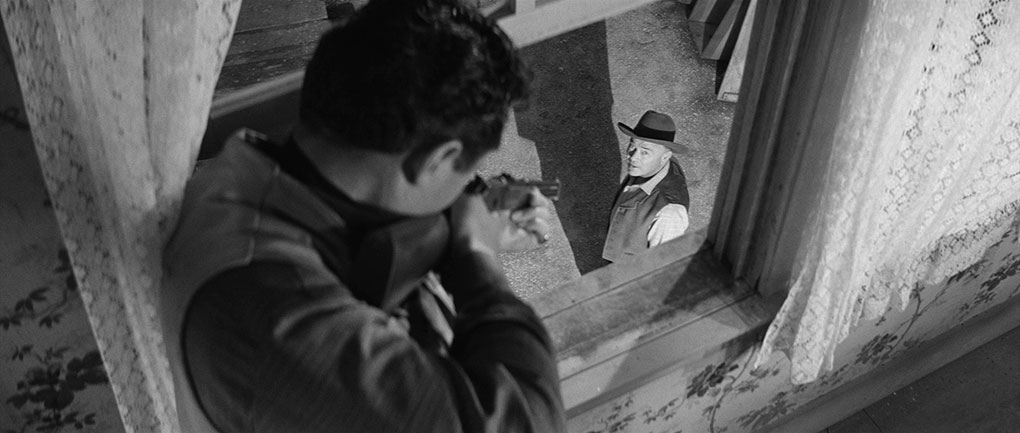
A Fuller Life (80:24)
While most of the special features here have been ported over from Eureka’s earlier Blu-ray, this is a new addition, and it’s a biggie. The bad news is that it’s in standard definition. The good news is that it’s a complete, feature-length documentary on Fuller, made and introduced by his daughter Samantha, and previously only available as a stand-alone DVD import that still retails on Amazon for something like £21. And here it’s a special feature! And it’s great! Structurally, it’s a model of absolute simplicity, as a number of Fuller’s colleagues and admirers take turns to read passages from his autobiography, A Third Face: My Tale of Writing, Fighting & Filmmaking. This is illustrated with film clips, archive photos, personal memorabilia, 16mm film material shot by Fuller during the Second World War, and footage of the contributors reading their allotted passages. These unfold sequentially to tell the story of Fuller’s early life, his wartime experiences and his later work as a writer and director. It may sound a bit by the documentary numbers, but it proves to be absolutely mesmerising stuff, and the reasons are easy to fathom. First up, every word spoken after Samantha’s introduction was written by Fuller himself, and not only was he one hell of a writer, he was writing here about his own often colourful life and experiences, and did so with wit, passion and a real skill for telling an engaging anecdote. Enlivening these words is an absolute belter of a cast, one that includes James Franco, Jennifer Beals, Bill Duke, James Toback, Kelly Ward, Perry Lang, Robert Carradine, Mark Hamill, Joe Dante, Tim Roth, Wim Wenders, Monte Hellman, Buck Henry, Constance Towers and William Friedkin. Not only does this bring variety to what could have worn a little thin over the course of the film had there been a single narrator, it allows each to bring something of themselves to their readings, with the actors in particular infusing their delivery with real emotion and expression. This peaks early on will Bill Duke’s impassioned reading of Fuller’s recollection of his first dealings with the Ku Klux Klan when working as a reporter, with Duke beautifully capturing not just Fuller’s righteous anger but also the manner of his vocal delivery. It’s no wonder that Samantha Fuller chose to let Duke speak for longer than any of his fellow contributors. Even if you’re familiar with Fuller’s early life as a reporter and his military service, this is still essential viewing, as much for the delivery as for the content, both of which are terrific. A superb extra.
Jean-Louis Leutrat (16:56)
French film critic and writer Jean-Louis Leutrat offers an interesting reading of Forty Guns, its lead performances and the Wyatt Earp connection, and outlines how the film influenced the work of Sergio Leone, Clint Eastwood and Jean-Luc Godard. I could have done without the distracting – though occasionally effective – pop art presentation, but it's definitely worth a look.
Theatrical Trailer (2:08)
"Notorious Jessica Drummond leading her 40 thieves to hit the West like a Texas tornado!" Given what happens during the course of the film, that's not as daffy as it first sounds. Has a couple of major spoilers for newcomers, so don't watch this before settling down for the main feature.
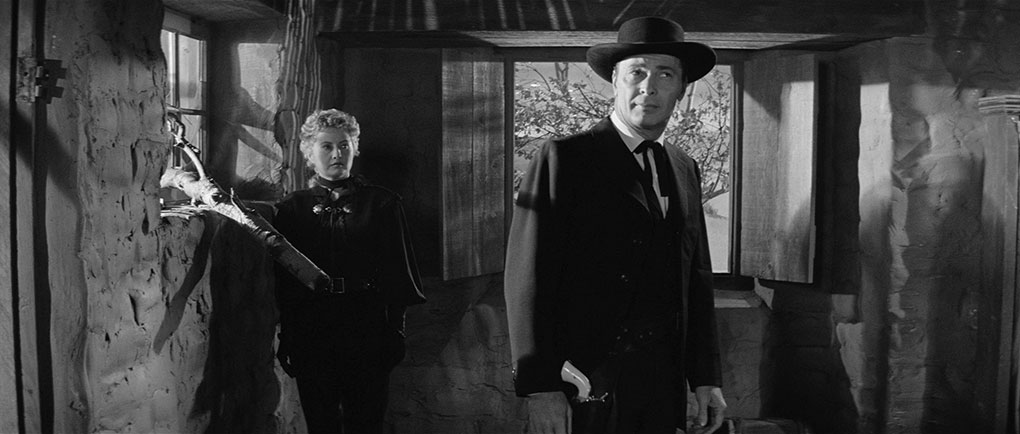
Booklet
Once again, it would have been easy for Eureka to simply reproduce the content of the booklet that accompanied the 2015 release, but they didn’t, bless ‘em. Instead we get an enjoyable new essay of Fuller and the film by Amy Simmons, a 2015 essay titled Women After All by Murielle Joudet (translated from the original French by Craig Keller), and a brief but interesting appraisal of the film from 1957 by none other than Jean-Luc Godard and translated by Tom Milne. Finally, there’s a posthumously published piece from 2002 by Fuller himself on the making of the film – the preceding essays are all enthralling, but Fuller, as ever, is the most entertaining. As with the other releases in this set, this content is part of a larger booklet covering all five films.
If you already have Eureka’s stand-alone Blu-ray release of Forty Guns then whether it’s worth buying the Fuller at Fox: Five Films 1951-1957 box set just for the transfer upgrade and the documentary will be very much your call. If you’re a fan of this maverick director’s work, however, just look what else you’re getting, and there are two more films in addition to the three we had review discs for, and they both have special features and new HD transfers too. If I’ve not sold you on this set by now I doubt I ever will, but for Fuller fans there really is no choice here. Get this box set.
- The Union Pacific Story. The plot concerns construction of a railroad, a telegraph line, or some other type of modern technology or transportation. Wagon train stories probably fall into this category.
- The Ranch Story. The plot concerns threats to the ranch from rustlers or large landowners attempting to force out the proper owners.
- The Empire Story. The plot might involve building up a ranch empire or an oil empire from scratch, a classic rags-to-riches plot.
- The Revenge Story. The plot often involves an elaborate chase and pursuit, but it may also include elements of the classic mystery story.
- The Cavalry and Indian Story. The plot revolves around taming the wilderness for white settlers.
- The Outlaw Story. The outlaw gangs dominate the action.
- The Marshal Story. The lawman and his challenges drive the plot.
An eighth was later added titled Going Native to include stories like Thomas Berger's Little Big Man, in which a white man or woman makes their home with a native American tribe. |